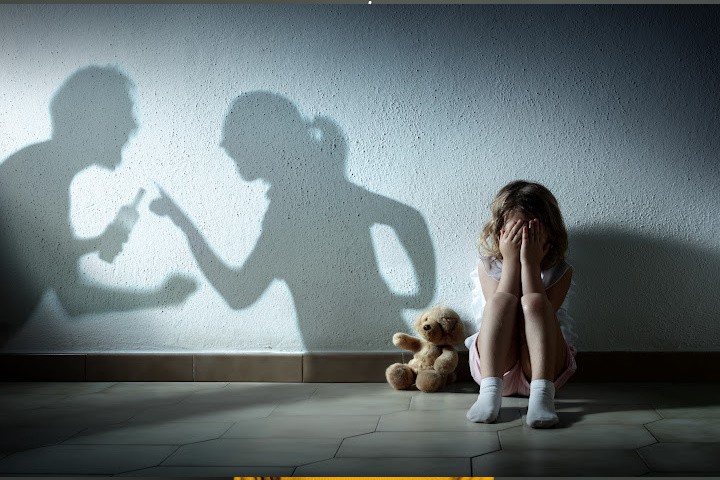Parents fighting in front of kids – what happens to your child
Having parents fighting is common. People fight. Parents fight. That’s the reality of life. They’re going to fight about a lot of things. From little things such as what television channel to watch, to important thing like whether they should have another child, the stakes can be high and parents’ emotions can run high.
Not all parents’ fights are terrible and need to be avoided. The way adults deal with these conflicts in front of their children can have different consequences for children.
How does parents fighting affect a child
In real life, conflict is a natural part of any relationship. When we live with kids, these conflicts will sometimes be brought up in front of your children. You may find yourselves wondering: Does parents fighting in front of the kids hurt the children in any way?
It is always upsetting and stressful to witness parents arguing. The good news is that not all types of conflicts will have adverse effects on children in the long run.
Whether adults arguing will harm young kids depends on its frequency, intensity, context and the way it is resolved.
Research shows that parents’ conflicts that can generate significant negative effects for children have the following characteristics:

1. They are frequent
It is always stressful for anyone to witness two people yelling at each other. But it’s even more distraught for little kids. Angry parents fighting on a regular basis can lead to greater distress in small children.
When a child is in distress, the level of stress hormone cortisol spikes. If the arguments only occur occasionally, the child’s hormonal level returns to normal soon after the episode. However, constant conflicts create frequent fluctuations in the cortisol levels and disrupt the cortisol patterns causing physical health problems such as brain shrinkage, sleep disturbance, and weakened immune system.
Frequent conflicts are also associated with increased behavioral problems such as aggression and defiance, and conduct disorders in children like oppositional defiant disorder. Children’s relationships with parents will also deteriorate as a result.
Children who experience regular parental fighting are also more reactive. When confronted with conflict later, their reactions are more intense. These children are more prone to anxiety issue and withdrawal problems.
Frequent fights also increases the child’s aggression with siblings and peers in school.
2. They are intense & destructive
When parents fight intensely in front of their kids, the child picks up on the tension, negative emotions and perceived threat.
When a child is exposed to destructive tactics such as verbal aggression, physical violence or outlandish threats, their aggressive behavior also tend to increase.
Emotional problems and mental health issues such as low self-esteem, depression, anger, and self-harm are more likely to occur in these children.
3. Child-related
The impact of arguing in front of the child also depends on how the child interprets the parental conflict.
In case the conflict concerns the child, they may feel shamed and worried about being drawn into the fight. Fighting like this is not only upsetting, but also threatening to the child.
Conflict topics of this type also tend to elicit a higher level of aggression.
4. Poorly resolved
Poorly resolved family conflicts can have a negative impact on the marital relationships, parent-child relationship and family functioning.
When an argument lacks a good explanation, or contains parent-blaming or child-blaming, the emotional damage to kids can be greater.
A study shows that some children, especially boys, may blame themselves for the conflict.

How to reduce the negative effects on children
Marital conflict is often the source of family stress and adjustment problems in children.
While people disagree, the conflict does not need to hurt the kids. Children do not have to be the collateral damage in a marriage discord.
These tips can help minimize the impact on your child’s mental health.
1) Avoid destructive conflicts
We don’t have to avoid all disagreements in front of children, and in reality, we can’t.
A resent study has actually found that marital conflict can be beneficial to development if that conflict is constructive.
Destructive conflict behaviors include nonverbal anger, parent’s silent treatment, or parental withdrawal. These silent tactics upset children just as much.
The best thing to do when open fights happen is to avoid using destructive strategies.
2) Model respectful disagreement
Not all arguments are bad if we disagree respectfully.
Let’s say two kids get into a fight, how do you want them to resolve it. Then do exactly that the next time you get into a heated argument with your partner.
Children learn from our behaviors. Hostile exchanges between parents unwittingly model aggressive behavior. They teach kids that being aggressive is the “grown-up way” to resolve conflicts.
Thus, keeping the exchanges respectful among family members will teach kids proper conflict resolution skills. Keeping the argument between the parents respectful will also prevent the levels of conflict from escalating.
3) Limit topics of disagreement
Not all topics of arguments are equally upsetting to kids.
According to research, disagreements over finances, economic issues, time management, and goal setting do not affect the child’s emotions, but disagreements over child rearing do.
Limit the kinds of conflicts so that child-related or difficult topic is only discussed behind closed doors.
4) Use constructive conflict behaviors
Constructive conflict behaviors have been linked to positive outcomes in children by improving the child’s security, positive emotions, sleep, academic achievement, social skills, problem solving skills, conflict resolution, stress coping and health-related outcomes.
Constructive conflict behaviors include
- Initiate affectionate contact rather than using aggression
- Be respectful even when you disagree
- Give constructive criticism instead of shame or blame
- Use problem-solving to come to a solution, even a partial solution can help if it is constructive
- Explain the situation to your child and do not blame them for the conflict

5) Seek family therapy
Unresolved challenges to families can create risky family environments and serious problems for children.
For dysfunctional families that experience high levels of conflict, it is hard for parents to resolve the situation on their own. Professional help such as family therapy is one of the best ways to get your life back on track.
A professional therapist can help you find a better way to deal with high-conflict situations and avoid emotional distress. They can also help the entire family develop healthy relationships, anger management strategies and emotion regulation skills.
Previous:Enmeshed Family – Signs of Enmeshment And How To Rebuild Boundaries
Next:3 Powerful Types Of Parenting Goals That Will Change Your Life 2022
-
What is helicopter parenting | Signs | Examples | Effects | Is helicopter parenting good or bad | How to stop Although helicopter parents have earned quite a negative reputation in mainstream media, researchers have not found consistently negative
-
There are good reasons to decide to cut a little boys hair at home. Money, for instance --- most boys will need a haircut at least every two months, and particularly for families with more than one child, this can amount to a considerable sum of mone
-
If school mornings are currently an overwhelming ordeal, filled with shouting, frantic breakfast-guzzling, nagging, unorganized backpack-packing and temper tantrums -- all for the kids to end up at the school frazzled, and just in time for a late sli


